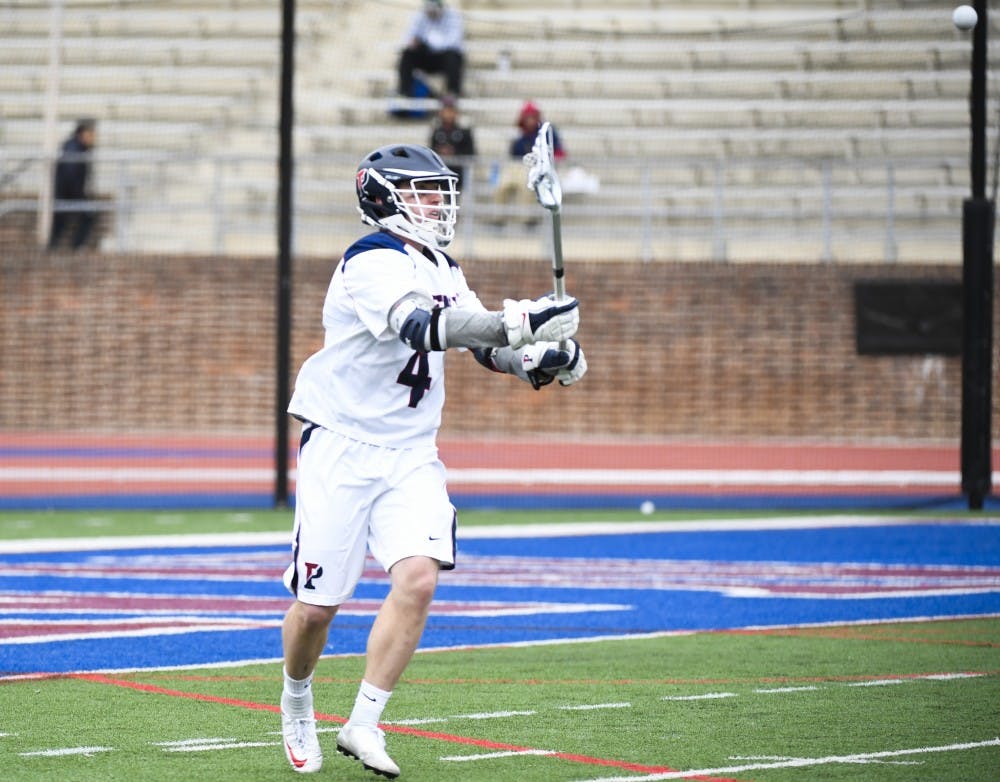
Senior attackman Kevin McGeary scored the game winner in the second overtime period for his only goal of the day.
Credit: Chase Sutton60 minutes was not enough to decide a winner in Penn men's lacrosse epic matchup with Dartmouth. Nor was a full overtime period.
But when it was all said and done, the Quakers (7-7, 3-3 Ivy) picked up a 10-9 double overtime victory over the Big Green (2-10, 0-5), a win that is crucial for Penn's postseason hopes.
After starting 1-3 in Ivy play, Penn has fought their way back into contention for the Ivy League Tournament. While Penn is done with its regular season, the rest of the league plays next weekend. The Quakers currently sit ahead of a trio of 2-3 teams, and depending on next weekend's results, could very well find themselves in the postseason.
What started as a low scoring affair opened up in the fourth quarter, with the two teams combining for nine goals. Penn scored four straight to take a 8-6 lead with just eight minutes left. However, the Big Green responded with two goals of its own just 37 seconds apart to tie the game up.
Penn again took the lead with just 1:13 remaining on a laser shot from senior midfielder Reilly Hupfeldt. But once again, Dartmouth struck to knot the game up with only 27 seconds left to force overtime.
The first overtime period was evenly matched and included a nice save from junior goalie Reed Junkin. Still, there was no separation between the two teams. That separation came in the second overtime from the stick of newly-drafted senior attackman Kevin McGeary for his only goal of the game.
Though the score indicates differently, the statistics show that Penn deserved to win the game. Penn outshot Dartmouth 42-26, and clearly had the edge on faceoffs, winning 15 of 23. Junior faceoff man Richie Lenskold continued his hot streak and will be crucial to Penn’s chances of making a run in the Ivy League Tournament and/or NCAA tournament.
“Our biggest improvement from day one to now is faceoffs,” coach Mike Murphy said. “We really struggled for a while until Richie Lenskold developed into a player we could rely on.”
Winning faceoffs is key to winning any lacrosse game, but in close contests the importance of an advantage at the faceoff X cannot be overstated. Today, Penn won the close contest in large part due to success on faceoffs.
However, in the Quakers' last Ivy League loss, against Brown two weeks ago, they dropped a one-goal contest in which they outshot their opponent by a large margin. The difference: they were beat 14-7 on faceoffs. Moving forward, Penn must continue to thrive at the faceoff X if it wants to compete with the nation's best.
Close games have been a theme for Penn this season. Three of the Quakers' last four contests have been decided by one goal, and eight of their 14 on the season have been decided by less than three goals. Managing players emotions down the stretch to avoid this issue is one of the most important jobs of a coach.
“First I just try to remain calm myself,” Murphy said. “Then I just try to make sure guys stick to what they know how to do. Timeouts are useful to remind them to stick to what has brought them success all year.”
Staying levelheaded in close games will be vital in the postseason. There should be no lack of confidence for this Penn team though — they took down No. 1 Duke in a one goal comeback thriller earlier in the season.
In a season that already possesses one of the biggest wins in program history, there may be even bigger ones in store.
The Daily Pennsylvanian is an independent, student-run newspaper. Please consider making a donation to support the coverage that shapes the University. Your generosity ensures a future of strong journalism at Penn.
Donate







